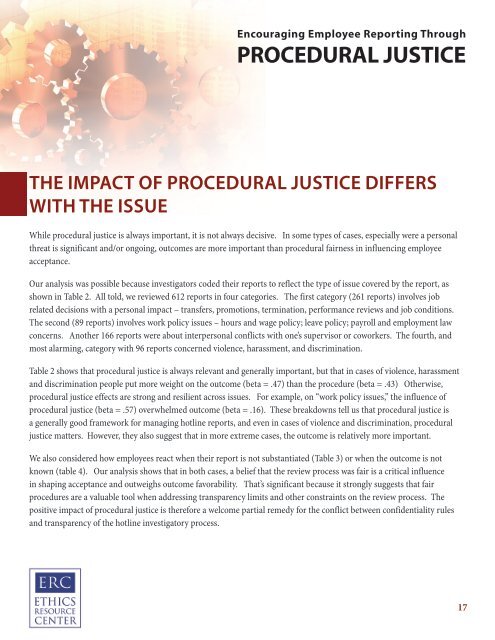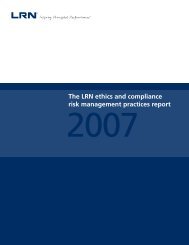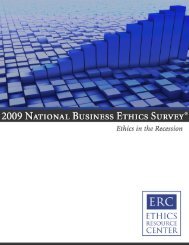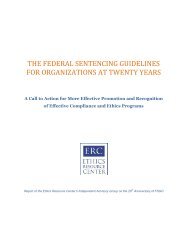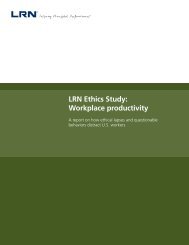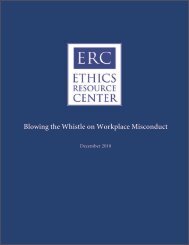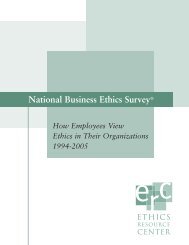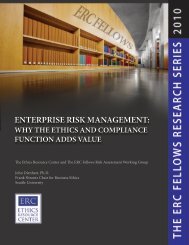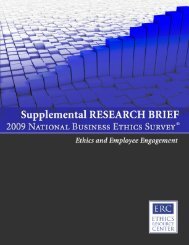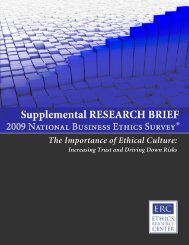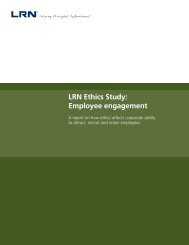PROCEDURAL JUSTICE - Ethics Resource Center
PROCEDURAL JUSTICE - Ethics Resource Center
PROCEDURAL JUSTICE - Ethics Resource Center
Create successful ePaper yourself
Turn your PDF publications into a flip-book with our unique Google optimized e-Paper software.
Encouraging Employee Reporting Through<br />
<strong>PROCEDURAL</strong> <strong>JUSTICE</strong><br />
THE IMPACT OF <strong>PROCEDURAL</strong> <strong>JUSTICE</strong> DIFFERS<br />
WITH THE ISSUE<br />
While procedural justice is always important, it is not always decisive. In some types of cases, especially were a personal<br />
threat is significant and/or ongoing, outcomes are more important than procedural fairness in influencing employee<br />
acceptance.<br />
Our analysis was possible because investigators coded their reports to reflect the type of issue covered by the report, as<br />
shown in Table 2. All told, we reviewed 612 reports in four categories. The first category (261 reports) involves job<br />
related decisions with a personal impact – transfers, promotions, termination, performance reviews and job conditions.<br />
The second (89 reports) involves work policy issues – hours and wage policy; leave policy; payroll and employment law<br />
concerns. Another 166 reports were about interpersonal conflicts with one’s supervisor or coworkers. The fourth, and<br />
most alarming, category with 96 reports concerned violence, harassment, and discrimination.<br />
Table 2 shows that procedural justice is always relevant and generally important, but that in cases of violence, harassment<br />
and discrimination people put more weight on the outcome (beta = .47) than the procedure (beta = .43) Otherwise,<br />
procedural justice effects are strong and resilient across issues. For example, on “work policy issues,” the influence of<br />
procedural justice (beta = .57) overwhelmed outcome (beta = .16). These breakdowns tell us that procedural justice is<br />
a generally good framework for managing hotline reports, and even in cases of violence and discrimination, procedural<br />
justice matters. However, they also suggest that in more extreme cases, the outcome is relatively more important.<br />
We also considered how employees react when their report is not substantiated (Table 3) or when the outcome is not<br />
known (table 4). Our analysis shows that in both cases, a belief that the review process was fair is a critical influence<br />
in shaping acceptance and outweighs outcome favorability. That’s significant because it strongly suggests that fair<br />
procedures are a valuable tool when addressing transparency limits and other constraints on the review process. The<br />
positive impact of procedural justice is therefore a welcome partial remedy for the conflict between confidentiality rules<br />
and transparency of the hotline investigatory process.<br />
17


